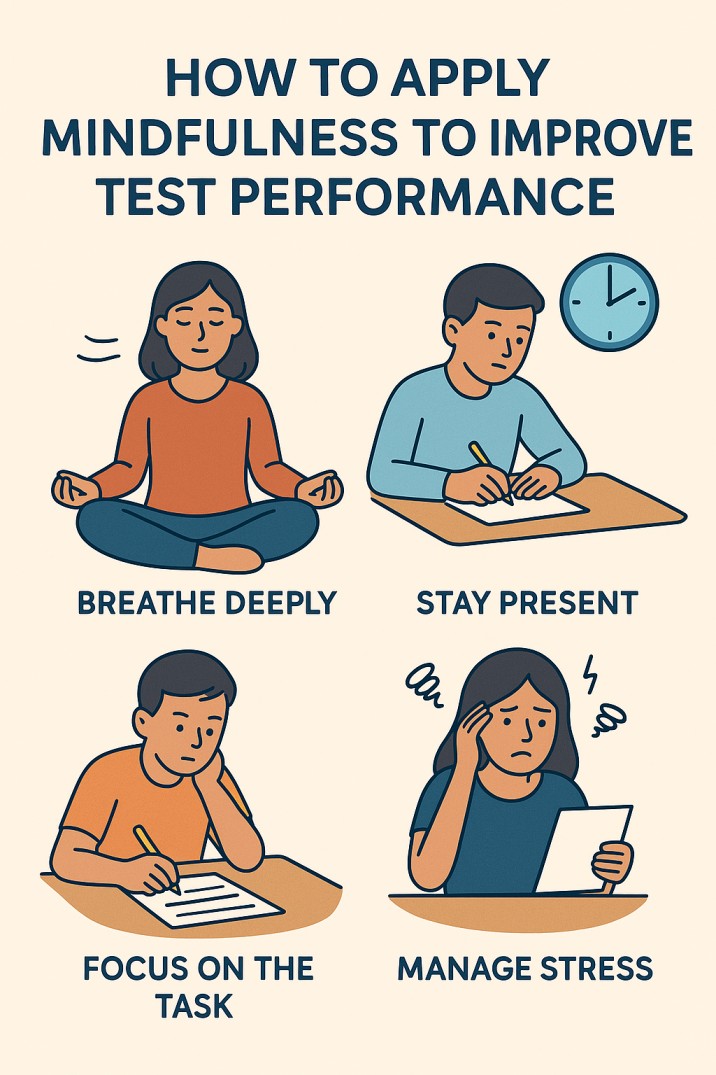How to Apply Mindfulness to Improve Test Performance

Pressure, anxiety, and mental fatigue are always a part of test-taking and are sure to impact performance in a substantial proportion. Even higher-performing students forget everything or even think about nothing on test days because of overwhelming pressure. Mindfulness for test anxiety, being that presence- and awareness-enabling psychological process, has worked as an amazing antidote in managing pressure and improving concentration over the last few years. On the basis of using mindfulness skills every day, the students reduce the level of anxiety and maximise their ability, and hence there would be a betterment in the ability to carry out tests.
Test worry stops kids from showing their real skills. Simple mind actions like deep breaths, sitting still, and feeling your body help calm thoughts and up focus. By learning to live in the now and handle stress, kids can face tests with more clear thoughts and sureness. This piece will dive into easy, mind ways that can fit right into daily plans to make mental sharpness and work better under stress.
More than easing stress, mindfulness test prep also supports memory and brain power—key components for doing well on tests. Regular mind exercises train your brain to keep alert, work with info well, and remember stuff when you need it. Kids who use these methods often see better study ways, higher scores, and long-term school gains. Keep reading to find real tips to use mind care to boost your test results and reach your top school level.
4 Powerful Mindfulness Techniques to Skyrocket Your Test Performance
Decreases Test Anxiety
Mindfulness relaxes the nervous system and reduces harmful stress hormones like cortisol. As one of the most effective anxiety reduction techniques. It creates space for a still mind, and a person can easily start to concentrate while under test conditions.
Improves Concentration
Strict mindfulness improves the ability to maintain attentional function, and evidence shows that one can read easily and concentrate while under test conditions.
Facilitates Recall of Memory
Recall of memory is affected by stress. Mindfulness decelerates the mind, and the brain quite easily recalls facts memorised.
Gives One More Control over Emotions
Mindfulness makes one in control of negative thoughts and stays positive regardless of fear of hard questions.
Mindfulness Exercises to Practice to Perform Well in Tests

1.Mindful Breathing
It is the simplest and most effective mindfulness exercise.
Use when: Relaxation after studies or before an exam.
Become focused in every area of your body, from the toes to the head.
Feel things without trying to control them, and let all spaces go as you ascend.
2.Conscious Studying
Study with whole concentration to gain maximum comprehension and recall from memory.
Purposefully take a break through deep breathing or stretching after each session.
3.Visualization
Visualization is positive self-talk with awareness.
Visualize writing solutions effortlessly and achieving the desired result.
When to do: Before evening nap before the test, and morning classes for self-confidence.
4.Grounding Strategies While Taking Tests
Anxiety hijacks test-taking.
Combine with healthy lifestyles:
Sleep, food, and work outs make mindfulness work better. Mindfulness is not just a fresh way to cut down stress. It also has strong proof to help focus, recall, and mood. By getting students to try mindfulness often when they face stress or tough times, they will get calm, think well, and do better. They can use this mindfulness when they study and take tests. With school races on, mindfulness gives a clear yet strong edge: stay here, brave it, and stay on top in every test.
Final Thoughts: Stay Alert to Get High Test Scores
In school’s tough world, staying alert really aids students in managing test stress and scoring better. Simple acts like deep breaths, full attention during study time, picturing success ahead, and keeping sure help cut stress, boost clear thinking, and improve memory—all key for nailing tests.

Using this alertness daily not only eases the mind; it also sharpens the brain to stay keen, think smarter, and tackle tough questions with belief. When combined with good sleep, right eating, and working out, this habit helps students stand out when it counts.
In the end, staying alert offers students more than high scores—it grants them power, better control over emotions, and a joyful mindset that lasts way past school days. For anyone aiming for great test results and to reach their best, picking this alert path is the clear choice for a calm, smart, and successful exam time.
FAQs on Mindfulness for Test Anxiety
1. What is mindfulness for test anxiety?
Mindfulness for test anxiety is the practice of staying present and aware during exam preparation and test-taking, instead of letting stress and fear take over. Many students experience rapid heartbeat, sweaty palms, and racing thoughts when they sit for exams. These symptoms are signs of anxiety, not lack of knowledge. Mindfulness helps students notice these feelings without judgment and calmly bring their focus back to the task at hand. This reduces panic and creates the mental space needed to recall information and think clearly.
2. How does mindfulness reduce test anxiety in students?
Mindfulness for test anxiety gets reduced by lowering stress hormones like cortisol and activating the body’s relaxation response. When a student practices mindful breathing or grounding, the nervous system shifts from “fight or flight” to a calm, balanced state. This makes it easier to stay focused on the present moment instead of worrying about results. Over time, consistent practice rewires the brain to handle exam stress with more resilience.
3. What are the best mindfulness techniques for test anxiety?
The best techniques in mindfulness for test anxiety include:
Mindful Breathing – focusing attention on slow, deep breaths to calm nerves.
Body Scan – noticing sensations from head to toe to release tension.
Visualization – imagining yourself writing answers confidently and succeeding.
Grounding Exercises – using the five senses to reconnect with the present during anxious moments.
Each of these mindfulness for test anxiety techniques can be done in just a few minutes, making them ideal for students who want to manage anxiety during study sessions or before exams.
4. Can mindfulness for test anxiety improve concentration during exams?
Yes. mindfulness for test anxiety is proven to improve concentration during tests. When students are anxious, their minds wander to thoughts like “What if I fail?” or “I don’t remember anything.” This mental noise blocks focus. By practicing mindfulness, students train their attention like a muscle. During an exam, this ability helps them read questions carefully, avoid careless mistakes, and stay engaged until the test is over.
5. How often should students practice mindfulness to reduce test anxiety?
Students should aim to practice mindfulness for test anxiety daily, even for just 5–10 minutes. Consistency is more important than duration. A short mindful breathing session before studying, another before bedtime, and a quick body scan before an exam can make a huge difference. Practicing regularly builds a long-term habit that trains the brain to handle anxiety automatically during stressful moments.
6. Can mindfulness be used right before an exam to calm nerves?
Yes, mindfulness for test anxiety is especially helpful right before an exam. Many students feel anxious in the minutes leading up to entering the exam hall. Quick techniques such as closing the eyes, taking three deep breaths, or visualizing a calm outcome can immediately reduce stress. These short practices prepare the mind for clear thinking, helping students enter the exam room with confidence.
7. Is mindfulness for test anxiety backed by science?
Absolutely. Several scientific studies show the effectiveness of mindfulness for test anxiety and improving performance. For example, research published in Psychological Science found that students who practiced mindfulness improved working memory and GRE scores while reducing mind wandering. Other studies in educational psychology confirm that mindfulness lowers stress and enhances focus. This scientific backing makes mindfulness a reliable and evidence-based tool for test preparation.
8. Can mindfulness exercises help with long-term exam preparation?
Yes, mindfulness for test anxiety is not only useful during exams but also during study sessions. Practicing conscious studying—where students focus fully on reading or solving problems without distractions—helps build better comprehension and memory. Taking mindful breaks with deep breathing or stretching prevents burnout. Over weeks of preparation, mindfulness develops stronger study habits, making revision more effective and less stressful.
9. How does mindfulness compare to other stress-reduction techniques?
Mindfulness for test anxiety stands out because it is simple, cost-free, and effective anywhere. Unlike medication or therapy, it requires no special tools. Unlike motivational talks, it provides a practical skill students can use instantly. While exercise and sleep are also powerful stress-reducers, mindfulness for test anxiety directly trains the mind to remain calm under pressure. When combined with healthy lifestyle choices, it becomes one of the strongest strategies to reduce exam stress.
10. Can mindfulness exercises be taught in schools to reduce test anxiety?
Yes. Many schools worldwide are introducing mindfulness mindfulness for test anxiety programs to help students manage academic pressure. Even a few minutes of mindful breathing at the start of a class can set a calmer tone for the day. Teachers who encourage students to pause, breathe, and stay present during lessons often see improved focus, fewer distractions, and better test outcomes. Schools that adopt mindfulness create an environment where students can thrive academically and emotionally.
11. Can mindfulness for test anxiety help with competitive exams like SAT, GRE, or board exams?
Definitely. Competitive exams bring higher stakes, which often means more anxiety. Students preparing for SATs, GRE, or board exams face long study hours and high pressure. Practicing mindfulness helps them sustain concentration during preparation, manage stress on exam day, and recover quickly from setbacks. By training their minds to stay present, students can maximize their effort and performance in high-stakes exams.
12. What role does lifestyle play in making mindfulness effective for test anxiety?
Mindfulness for test anxiety works best when supported by healthy lifestyle habits. Getting 7–8 hours of quality sleep, eating balanced meals, and exercising regularly all enhance mindfulness benefits. A well-rested and nourished brain responds better to mindful practices, making it easier to reduce anxiety and stay focused. Students who combine mindfulness with healthy routines are more likely to feel calm and perform at their best during exams.
13. How long does it take to see results from mindfulness for test anxiety?
Some students feel calmer after just one session of mindful breathing. However, lasting benefits come with regular practice. After 3–4 weeks of daily practice, many students notice reduced stress, sharper concentration, and better recall. By exam day, mindfulness mindfulness for test anxiety becomes a natural habit that helps them stay grounded and confident.
14. Can mindfulness help during an exam if a student suddenly panics?
Yes. If a student experiences sudden panic during an exam, mindfulness can bring quick relief. Taking a few deep breaths, focusing on sensations like feet on the floor, or silently repeating a calming phrase like “I am here, I can do this” can stop the panic spiral. These techniques reset the nervous system and help students return to the test with clearer focus.
15. Why should every student try mindfulness for test anxiety?
Every student can benefit from mindfulness for test anxiety, regardless of their academic level. Anxiety can block knowledge and reduce performance, even for high achievers. Mindfulness is free, easy to learn, and scientifically proven to improve concentration, memory, and emotional balance. By practicing daily, students not only prepare better for exams but also build resilience and confidence for life beyond academics
References
[1] M. D. Mrazek et al., “Mindfulness training improves working memory capacity and GRE performance while reducing mind wandering,” Psychological Science, vol. 24, no. 5, pp. 776–781, 2013. Available: https://doi.org/10.1177/0956797612459659.
[2] J. Roeser et al., “Mindfulness training and reductions in teacher stress and burnout: Results from two randomized, waitlist-control field trials,” Journal of Educational Psychology, vol. 105, no. 3, pp. 787–804, 2013. Available: https://doi.org/10.1037/a0032093
Penned by Deepika
Edited by Shashank Khandelwal, Research Analyst
For any feedback mail us at [email protected]
Transform Your Brand's Engagement with India's Youth
Drive massive brand engagement with 10 million+ college students across 3,000+ premier institutions, both online and offline. EvePaper is India’s leading youth marketing consultancy, connecting brands with the next generation of consumers through innovative, engagement-driven campaigns. Know More.
Mail us at [email protected]
Penned by Names
Edited by Ritika Sharma, Research Analyst
For any feedback mail us at [email protected]
Transform Your Brand's Engagement with India's Youth
Drive massive brand engagement with 10 million+ college students across 3,000+ premier institutions, both online and offline. EvePaper is India’s leading youth marketing consultancy, connecting brands with the next generation of consumers through innovative, engagement-driven campaigns. Know More.
Mail us at [email protected]
Penned by Names
Edited by Ritika Sharma, Research Analyst
For any feedback mail us at [email protected]
Transform Your Brand's Engagement with India's Youth
Drive massive brand engagement with 10 million+ college students across 3,000+ premier institutions, both online and offline. EvePaper is India’s leading youth marketing consultancy, connecting brands with the next generation of consumers through innovative, engagement-driven campaigns. Know More.
Mail us at [email protected]